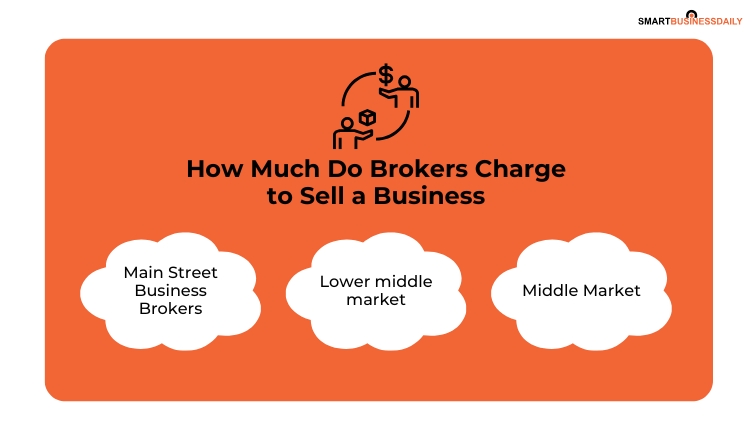How Much Do Brokers Charge to Sell a Business? [Expert’s Opinion!]
07 November 2024
6 Mins Read
![How Much Do Brokers Charge to Sell a Business [Expert’s Opinion!]](https://www.smartbusinessdaily.com/wp-content/uploads/2024/11/How-Much-Do-Brokers-Charge-to-Sell-a-Business-Experts-Opinion.jpg)
toc impalement
How much do brokers charge to sell a business? If you have been searching for this answer, you have come to the right place!
Selling a company may sometimes be a daunting undertaking. Getting your company ready for sale may be expensive and time-consuming, and there’s frequently no assurance that you’ll receive the desired price.
For this reason, when they are ready to sell, many small business owners decide to deal with a business broker. Using a business broker to sell your company has advantages and disadvantages.
A business brokerage offers the experience, wisdom, and information you need to optimize your company’s worth and ensure you receive the best price when selling. However, not every business broker is made equal, and many of them can be costly.
Additionally, you might wish to work alone if you have prior expertise selling businesses and don’t want to lose control of the sales process.
Knowing how much it costs to hire a business broker is crucial before deciding whether or not to use one. Let’s examine the expenses of dealing with a business broker, such as fees and prices.
Who is a Business Broker?

A business broker helps in business purchases and sales. Most business brokers will collaborate with the business owner to determine the company’s worth and locate potential purchasers.
They will also assist in completing the deal and negotiating the conditions of the sale. A broker can also help sellers negotiate the transaction terms and offer guidance during the due diligence procedures.
Business brokers are often hired by owners who lack the time or experience to sell their companies on their own, and they may be quite helpful in this process.
How Does a Business Broker Help?
Selling a business may be difficult and time-consuming, particularly if you’re concentrating on managing your company. Business brokers should assist in streamlining the selling process to guarantee that owners get the greatest price for their companies.
Additionally, business brokers can assist in locating purchasers for companies that are not yet listed. Working with a business broker can help you optimize your company’s worth and guarantee a successful sale if you’re thinking about selling.
How Much Do Brokers Charge to Sell a Business?

Business brokers usually demand a fee of 10 to 20 percent of the entire sale price for their services. The buyer and seller typically divide this fee, collected at the sale’s closing.
For instance, you might anticipate paying between $10,000 and $20,000 in broker fees if your business sold for $100,000. Although this charge is normally nonrefundable, it could be negotiated based on your circumstances.
However, the size and classification of the business you plan to sell also matter.
Most firms can be classified into one of three revenue streams, with no hard and fast rules.
- Main Street Company: $1 million or more
- MidStreet or lower middle market: $1 million to $50 million
- Middle Market: at least $25 million
A separate typical pricing model applies to each group. Once more, your prices and fees may change because everything is changeable.
Main Street Business Brokers
“Main Street” company brokers typically sell companies with $1 million or less in revenue. Expect commission charges ranging from 8% to 10% of the sales price if your company falls into this group.
The vast majority of business brokers charge ten percent. TBH, in some cases, we can see commission charges ranging from 4% to 6% if you own the property where your business is located and wish to sell it. Most business brokers don’t charge retainers at this level.
Another thing to think about is that business brokers usually have a minimum commission that applies if your company is at the lower end of the spectrum. Typically, these minimum costs fall between $10,000 and $15,000.
Lower middle market
You are classified as a “lower middle market” or MidStreet business if your revenue is between $1 million and $50 million. Typically, a seasoned business brokerage firm sells companies at the bottom end of this group.
Nonetheless, most companies with an enterprise value of $3 to $5 million are sold by a boutique investment bank or M&A firm. The “Double Lehman” formula is a typical commission arrangement that many middlemen at this level use.
While in his blog I will tell you solely about the classic Double Lehman formula, there are several modifications and alternative pricing models.
But what fees are applied to the sales price under Double Lehman pricing? 10% of the initial $1 million and 8% of the additional $1 million. After that, they will start charging 6% for the third $1 million, 4% for the fourth, and 2% of the whole amount beyond that (more than $4 million).
Your intermediary can suggest a fixed commission on the full transaction price if you anticipate your company selling for $5 million. The sum usually appears in the same range when you do the arithmetic.
Let’s do a quick math on a $10 million sale to better understand this.
The commission amount, calculated using the Double Lehman formula, is $400,000. Your middleman can suggest a 4% flat commission rate.
Calculating 4% of $10 million yields, you guessed it, precisely $400,000. While many at this level do not charge retainers, others do.
Once more, when the cost of buying your company rises, the likelihood that a firm will charge a retainer also rises.
The minimum commission fee for lower middle market advisors is typically between $35,000 and $50,000.
Middle Market
“Middle Market” advisors typically work with companies that generate more than $25 million in revenue. Most success fees at this stage decrease to a straightforward percentage, typically between 1% and 4%.
Middle-market companies may also employ Lehman pricing variants (such as Standard Lehman Plus, Reverse Lehman, etc.).
Middle-market companies typically demand retainers ranging from $5,000 to $50,000 or more, depending on the contract size. Keep in mind that they may be billed on a monthly or upfront basis.
How Do Business Brokers Determine What to Charge?

People frequently ask business brokers how they calculate their fees. Although the answer varies from broker to broker, certain common criteria affect a broker’s fees. The deal’s structure is one crucial element.
For instance, modest transactions, such as the sale of a single company, usually result in a reduced fee for M&A offices. Fees for more complicated transactions, including business mergers, are typically greater.
The stage of the transaction your company is in is another crucial factor. Usually, business brokers charge more for preliminary company evaluation and creating a private marketing plan.
The broker’s fee will often increase if the transaction moves on to negotiation and due diligence. Ultimately, business brokers base their fees on several variables, and every situation differs.
Generally speaking, a broker can charge more if they have greater success and expertise. To find out how much your broker charges, you should ask them the following questions:
- How many companies have you sold in my industry?
- What is the duration of your company sales experience?
- What was the duration required to complete your most recent transactions?
- You have closed how many transactions?
- How successful are you?
Standard Business Broker Fees
Some business brokers charge an hourly rate or a fixed price for their services rather than being paid on commission. Depending on your broker’s location and degree of experience, an hourly cost might range from $50 to $300.
For their services, other brokers will offer a package deal that is paid for regardless of the labor or time required to sell your company.
A company broker may charge additional fees for marketing, accounting, and legal services. The majority of brokers’ regular packages usually do not contain these costs.
When figuring out the total costs of selling your company, including these extra fees in your budget is critical because they can mount up rapidly.
It’s crucial to remember that certain brokers could provide extra services like market research or advice, which could come with extra fees.
Can You Negotiate Business Broker Fees?
Although many people think that business broker fees are fixed, you can easily negotiate. Knowing the typical price schedule for a business broker is the first step in the negotiation process.
Most brokers take a commission, usually between 10 and 20 percent of the sale price. If they believe they will have trouble finding a buyer, some brokers could be willing to reduce their compensation.
Brokers might also be amenable to modifying their price schedule in light of the customer’s particular requirements. For example, some customers might prefer to pay a larger upfront cost in return for a smaller total commission.
In the end, talking openly and honestly with your broker about your objectives and budget is the best method to negotiate business broker fees. You’ll have a far better chance of coming to a mutually beneficial arrangement if you take the time to learn about each other’s needs.
Read More:


















Comments Are Closed For This Article